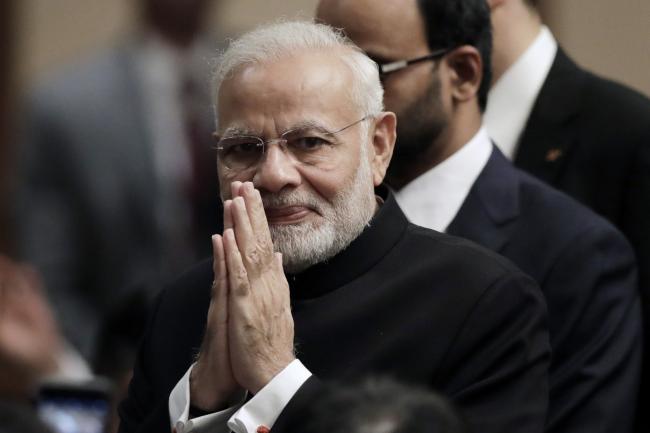(Bloomberg) -- Prime Minister Narendra Modi has unleashed a populist election-year budget designed to shore up support ahead of national polls, but it may have come too late to dampen criticism of his government’s inability to create millions of jobs.
The budget on Friday contained $13 billion worth of measures including payouts for farmers, a pension program for informal sector workers and tax relief for India’s squeezed middle class. The policies are designed to compensate for Modi’s government slide in support, and come just one day after a report suggesting India’s unemployment rate is at a 45-year high.
"The emphasis is clearly on populism," says Pratyush Rao, Control Risks’ associate director for South Asia. "You’ve got an election coming up and Modi is clearly under pressure."
Some of the measures, including tax cuts and incentives to buy houses, are aimed squarely at the ruling Bharatiya Janata Party’s core voter base of shopkeepers, traders and upper caste Hindus, and could be implemented early enough to refresh Modi’s image. But with roughly 875 million voters heading to the polls in two months, it’s not clear whether the government’s big ticket promises can have a meaningful impact in India’s vast hinterland.
Disaffected Voters
Delivered by interim Finance Minister and party stalwart Piyush Goyal, this budget was one of Modi’s last chances to announce big ticket programs ahead of the general election.
The minister’s speech was heavy on praise for many of Modi’s policies and doled out election-time goodies for many disaffected segments of Indian society. BJP minister Prakash Javadekar called the budget a "surgical strike" on India’s opposition Congress party. That’s an allusion to an attack on Pakistan that Modi’s government has widely publicized and has since been turned into a Bollywood movie -- which Goyal mentioned in his budget speech to parliament.
Congress leader, Rahul Gandhi, was quick to point out that Modi’s planned annual payout to farmers worked out to just 17 rupees a day, describing it as "an insult".
His party, which has gained in the polls, said the government’s promises were unlikely to be implemented. After pledging a targeted universal basic income policy earlier this week, Congress said the government’s measures will not take care of India’s most vulnerable, including landless farm laborers who will not receive payouts.
"While I welcome the support to farmers, I ask what about the non-farmer poor? What about the urban poor?" asked Palaniappan Chidambaram, a senior Congress leader and former finance minister. "The question that naturally springs to one’s mind is, ‘If these were important and necessary interventions, what was the government doing for five years?’"
Little Impact
Since the BJP lost three state elections in December, it has announced several populist policies even before this interim budget caused them to breach their own fiscal deficit target, causing bond yields to surge and the currency to drop.
But with campaigning likely to begin in earnest next month, some analysts said they believed the budget comes too late to change voters’ minds, particularly in the countryside.
"Voters already know who they’re going to vote for," said Shaibal Gupta of the Asian Development Research Institute in Patna, Bihar. "These type of last minute announcements won’t make much difference."
With the budget out of the way, some now expect the fight to become more personal, and more intense.
"What will matter in the coming weeks is how the campaigning goes, how Modi speaks," said Sudha Pai, a political science professor at New Delhi’s Jawaharlal Nehru University. "Now the battle will shift from the financial to the cultural and ideological."
